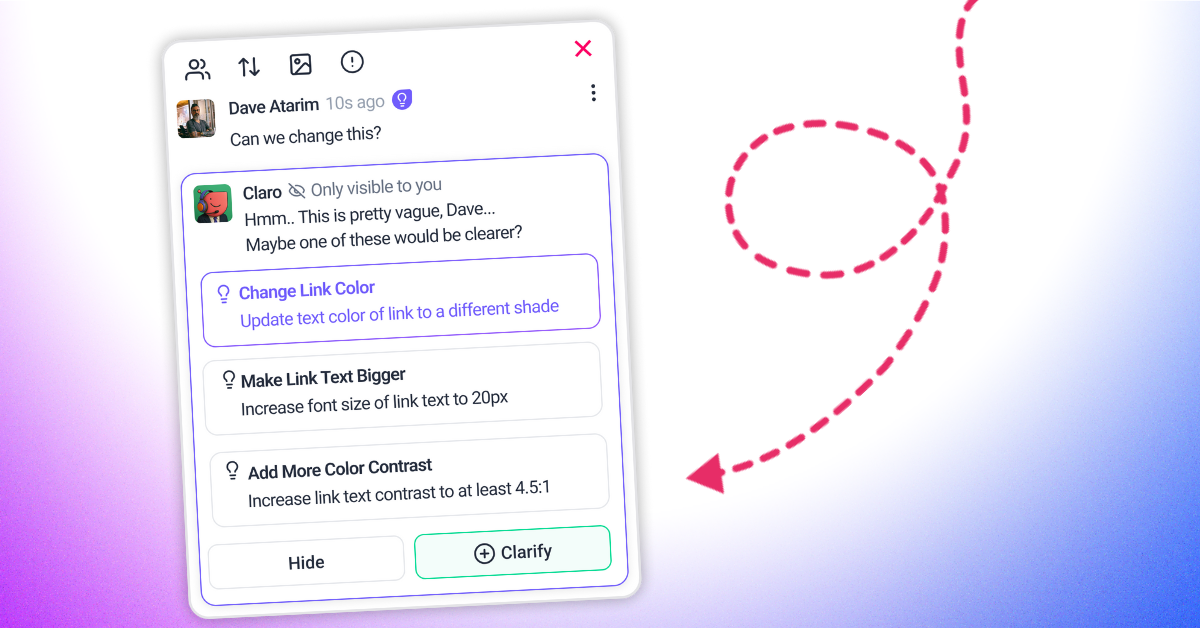Clarify Feedback Instantly with Claro
Turn vague or emotional feedback into clear, actionable tasks automatically with Claro.

Feedback is often rushed, unclear, or emotional, slowing down your workflows with endless clarifications. Claro, Atarim’s embedded AI agent, solves this by instantly rewriting messy or vague comments into clear, structured tasks. From a comment like “This feels off” to an execution-ready instruction like “Align the button with the headline and ensure it follows CTA spacing guidelines”. Claro keeps your projects moving.
In this guide, you’ll learn how Claro works, where it activates, and how to get the most out of it.
Relevant For
- Project Managers who want to reduce follow-ups and clarification delays
- Designers & Developers needing precise task specs
- Clients & Stakeholders who provide unstructured feedback
- QA & Internal Teams looking to streamline bug and issue reporting
Prerequisites
- No setup required — Claro runs in supported views ( Collaborate URL )
- Access to the InnerCircle Group
When Does Claro Activate?
- Vague client feedback
- Emotional or shorthand team notes
- Manual task creation with incomplete details
- Inputs flagged by other AI agents (Pixel, Glitch, etc.)
Note: Clear, well-written feedback is left untouched by Claro.
Step-by-Step Guide
Step 1: Understanding the Feedback Problem
Most client or stakeholder feedback is high-level and unspecific. Examples include:
- “Doesn’t feel right”
- “Not sure about this section”
- “Make it pop”
- “Punch this up”
- “Make this text better”
While well-intentioned, these comments are unclear. They lack the structure and context required by developers and designers to act confidently without clarification.

Warning: Clarification suggestions are interpretations, not mandates. Review and confirm before implementation.
Step 2: How Claro Translates Feedback
When a vague comment is detected, Claro evaluates it in real time and takes two key actions:
1. Rewrites the Feedback
- Converts high-level language into direct, clear instructions
- Uses role-appropriate tone depending on whether the issue affects design, dev, or copy
- Ensures the output sounds natural, not robotic or templated
2. Attaches Context
Each task is bundled with the technical metadata a developer or designer would normally have to ask for:
- Screenshot at the time of comment
- DOM selector of the exact element
- Device, browser, and screen resolution
- Canvas source (e.g., WordPress or live site)
Real-World Example
Original Comment:
“Punch this up.”
AI Task by Claro:
“The text could be easier to read if it had a bit more contrast with the background, maybe by adjusting the text or background color..”



Note: This process removes ambiguity and ensures tasks are executable with no further input so every new comment is scored for clarity
Step 3: Keeping Feedback Pinned in the Canvas
Once the comment is converted, the resulting task is visually anchored to the exact element on the canvas. This ensures clarity on where the issue is and keeps the conversation focused.
Key Capabilities
- Tasks appear as overlays directly on the component in question
- Team members can:
- Reply with updates
- Change Status & Priority
- Reassign to another teammate
- Create Tags
- AI agents remain active, monitoring if follow-up issues arise nearby



Tip: Use this during feedback reviews or sprint grooming to immediately connect comments with visual fixes.
Step 4: Multi-Agent Feedback Collaboration
While Claro handles task clarification, other agents often assist.
Learn More About Lexi | Learn More About Pixel | Learn More About Index | Learn More About Navi
Learn More About Glitch | Learn How to Get the Most Out of the InnerCircle
| Agent | Contribution During Feedback |
|---|---|
| Pixel | Validates if visual feedback aligns with design system |
| Lexi | Reviews copy clarity in feedback that affects CTAs or headlines |
| Navi | Checks accessibility for contrast or structure concerns |
| Glitch | Runs console and layout tests if interaction is flagged |


Recommendation: Make sure the AI icon is enabled, or tag @innercircle to ensure your feedback is processed correctly.
FAQs
No. Claro runs automatically on all comments that contain vague or ambiguous phrasing.
Yes. The original comment and AI-rewritten task are both visible in the task thread.
Currently, Claro supports English-language tasks only. Multilingual expansion is in progress.
Yes. While Claro leads the rewrite, other agents like Pixel, Lexi, Navi, and Glitch may add supporting insights if the feedback touches their domain or when they are explicitly tagged.
Claro is only active inside Collaborate URLs (i.e., live website feedback projects). It does not currently function in the Inbox, Kanban Boards, or Design/Image Projects.
Clicking “Clarify” confirms that you want Claro to rewrite the original feedback. Once clicked, the AI-generated task will appear beneath the comment and will be attached to the task thread.
Yes. If the rewrite doesn’t help or you prefer your original comment, you can simply Ignore or Dismiss the AI-generated task. The original comment remains untouched, and Claro will not force its suggestion into the workflow.
Tips & Tricks
- Encourage clients to leave any feedback. Claro thrives on vague input
- Use shorthand internally. Let Claro handle the rewrites
- Use Claro rewrites during task reviews or team stand-ups
- Don’t overthink your comment. Claro will handle the polish
Summary
Claro is more than just an AI tool. it’s a game-changing solution that empowers teams to collaborate faster, smarter, and with far less friction.
In fast-moving digital environments, unclear feedback leads to bottlenecks, misalignment, and wasted effort. Claro solves this by bridging the gap between what someone meant and what your team needs to act. Whether feedback comes from a client unsure of terminology, a designer using shorthand, or a QA note flagged without full context. Claro interprets and translates it into meaningful, structured instructions.
By working in real-time and contextually, right inside Atarim’s feedback system. Claro helps you maintain momentum. It’s especially powerful in cross-functional teams, where miscommunication between designers, developers, project managers, and clients can easily stall progress.
